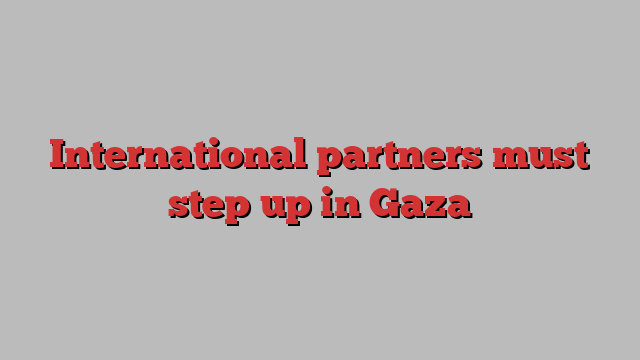
Unlock the Editor’s Digest for free
Roula Khalaf, Editor of the FT, selects her favourite stories in this weekly newsletter.
The writer is author of ‘Command: The Politics of Military Operations from Korea to Ukraine’
Whether the breach in the temporary ceasefire in Gaza turns out itself to be temporary, the fragility of the situation is all too apparent. Neither side dares let the other believe that its compliance to any agreement can be taken for granted. And even if the hostage-prisoner exchanges resume, they can only go on for so long. Israel is prepared to continue with its land operations in Gaza, confirming its control of the north and starting its move into the south. The very fact that it has been doing deals with Hamas, albeit through intermediaries, indicates that it is some way away from its goal of eliminating the organisation as a formidable presence in Gaza.
While the militant group has lost many commanders and thousands of individual soldiers — and has not been able to prevent a relatively quick Israeli advance — Hamas will have used the truce to prepare for the next round of fighting. Even if pushed back and forced into exile or underground, it will be capable of regeneration. So Israel, which has re-entered the conflict with plans for a “long war”, has to work out what more it can achieve as the fighting resumes, before the humanitarian distress leads to calls for restraint and another ceasefire.
The US is anxious to keep the war contained: it is urging a continual focus on hostages, reducing civilian casualties and damage to infrastructure in future fighting, restraining extremist settlers in the occupied West Bank, and not taking precipitate action against Hizbollah in Lebanon. Despite the degree of determination and mobilisation in Israel there are limits to its ability to degrade, let alone remove, the threats it faces.
Meanwhile if Hamas’s objective was to put the Palestinian issue back on the international agenda, it can claim success. Prior to the brutal attacks of October 7, the Palestinians appeared to be able to do little to hurt Israel. Occasional rocket barrages were dealt with effectively by the Iron Dome air defence system. The people were stuck behind fences, with both political and protest activity suppressed.
The rest of the Arab world viewed them as an irritation. Impressed by Israel’s technological prowess and economic dynamism, and with a shared distrust of Iran, more Arab countries were normalising relations with the Jewish state. When the attack came, Saudi Arabia was about to join the club. To be sure, all these countries warned that you cannot hold down millions of people indefinitely but they did not make improved relations conditional on doing much about it.
Unfortunately, now that the issue is back on the agenda, there are no obvious mechanisms for dealing with the immediate problems facing Gaza, let alone moving back to the “two-state solution” or some alternative. There is no political process currently in place to bring this round of fighting to a conclusion. Whatever Hamas might promise in terms of future restraint is not going to be enough for Israel. Even if the group survives in some form, it is hard to see how it can manage Gaza’s recovery. The extent of the destruction and number of displaced people is enormous. Those capable of providing the funding will be wary about handing it over to an organisation which has in the past prioritised military capabilities, including tunnels and rockets. Nor do Gazans seem keen about a Hamas-led future promising more of the same.
As things stand, the prospect is at best one of persuading Israel to hold back again as the UN agencies manage the humanitarian crisis, ready to go in hard if they see the militant group planning more operations. While it cannot occupy all of Gaza, it can hold some of the territory seized as an additional barrier to future incursions.
When it come to the long-term there is not only little trust between Israelis and Palestinians, but no leaders capable of doing the deal. The Palestinian Authority, widely seen as corrupt and ineffectual, has lost credibility. Benjamin Netanyahu’s days in power are numbered. For now, he stays in office by retaining far-right nationalists as partners. But after what has happened, even a new Israeli government, which will probably be led by Benny Gantz, is not going to lead on concessions to Palestinians — even if that may offer more security than the hardline policies of recent years that have now clearly failed.
The only way to get a political process in place quickly is to internationalise the issue, getting the leading Arab states, as well as the US and Europeans, to agree on next steps. This approach, widely canvassed since the start of this war, is not greeted with enthusiasm by the likely participants. The issue is not so much the funding for reconstruction, but the difficulties of forging a consensus on what needs to be done, and the potential for a long-term commitment that will be thankless, onerous and possibly hazardous, especially if it involves peacekeeping forces. The Egyptians and Jordanians have resisted large numbers of Palestinian refugees being pushed in their direction.
Any further respite that can be gained from a resumption of the ceasefire needs to be spent on working out how to deal with the tragedy of Gaza. Getting on to the terms for a stable Israel-Palestinian coexistence is too much for now. This is an issue long-marked as “too difficult” but we are now seeing the consequences of assuming there was no need to try again.